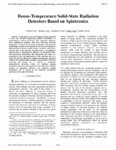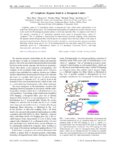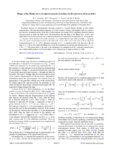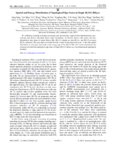Filters: Department: "Materials Science & Engineering" Format: "application/pdf" Collection: "ir_uspace"
| Creator | Title | Description | Subject | Date | ||
|---|---|---|---|---|---|---|
| 201 |
 |
Tiwari, Ashutosh | Rectifying electrical characteristics of La0.7Sr0.3MnO3/Zno heterostructure | We have fabricated a p - n junction, consisting of p-type manganite (La0.7Sr0.3MnO3) and n-type ZnO layers grown on sapphire substrate. This junction exhibits excellent rectifying behavior over the temperature range 20-300 K. Electrical characteristics of La0.7Sr0.3MnO3 (LSMO) film in this heterostr... | Manganites | 2003 |
| 202 |
 |
Liu, Feng | Role of vacancy on trapping interstitial O in heavily As-doped Si | We have investigated the interstitial oxygen (Oi) diffusion in heavily arsenic (As)-doped Si using first-principles calculations. We show that it is not the As per se but the Si vacancy (V) that trap Oi to reduce its diffusion. Arsenic actually plays the role of an arbitrator to activate thermal ge... | Vacancy; Interstitial oxygen; As-doped Si; Arsenic doped silicon; Oxygen trapping; Oxygen diffusion | 2008 |
| 203 |
 |
Tiwari, Ashutosh | Room-temperature solid-state radiation detectors based on spintronics | In this paper we are presenting a unique approach to solve the thermal background problem encountered in semiconductor nuclear detectors. Our approach addresses above challenge by making a shift from 'electronic detection mechanism' to 'spintronic detection mechanism'. The proposed methodology is ba... | 2012-01-01 | |
| 204 |
 |
Stringfellow, Gerald B. | Sb enhancement of lateral superlattice formation in GaInP | Epitaxial layers of GaInP were grown by organometallic vapor phase epitaxy with small amounts of TESb added to control the surface bonding. Above a concentration of Sb/III(v)=0.016, 12 K photoluminescence measurements show that the band gap is reduced, as compared to completely disordered GaInP, by ... | Tin; Epitaxy; Photoluminescence | 2001 |
| 205 |
 |
Liu, Feng | Sd2 graphene: kagome band in a hexagonal lattice | Graphene, made of sp2 hybridized carbon, is characterized with a Dirac band, representative of its underlying 2D hexagonal lattice. The fundamental understanding of graphene has recently spurred a surge in the search for 2D topological quantum phases in solid-state materials. Here, we propose a new ... | 2014-01-01 | |
| 206 |
 |
Liu, Feng | Seeing the atomic orbital: first-principles study of the effect of tip termination on atomic force microscopy | We perform extensive first-principles calculations to simulate the topographical atomic-force-microscope image of an adatom on the Si(111)-(7 X 7) surface, demonstrating the feasibility of imaging not only the atoms but also the atomic orbitals. Our comparative study of tip terminations shows that ... | First-principles; Tip termination; Adatoms | 2003-06 |
| 207 |
 |
Tiwari, Ashutosh | Self-aligned passivated copper interconnects: a novel technique for making interconnections in ultra large scale integration device applications | We have developed a technique to grow self-aligned epitaxial Cu/MgO films on Si (100) using a Pulsed Laser Deposition Method. In this method we deposit a uniform film of Cu/Mg (5-7%) alloy over Si (100) at room temperature using TiN as an intermediate buffer layer. As a result of HRTEM (with spatial... | Passivated copper interconnects; Diffusion barriers; Copper diffusion; Tantalum nitride | 2002 |
| 208 |
 |
Liu, Feng | Self-assembly of three-dimensional metal islands: nonstrained versus strained islands | A theoretical model for the Volmer-Weber growth of three-dimensional metal islands is proposed, with a dipolar island edge-edge interaction. The existence of such an island edge effect makes the island shape dependent on island size. Furthermore, it induces a stable island size against coarsening, l... | Self-assembly; Three dimensional islands; Metal islands; Nonstrained islands; Strained islands; Volmer-Weber growth | 2002-11 |
| 209 |
 |
Liu, Feng | Self-assembly of two-dimensional islands via strain-mediated coarsening | We demonstrate two distinctive effects of strain-induced island-island interaction on island size and spatial distribution during coarsening of 2D islands. When coarsening proceeds via only mass transport between islands, the interaction broadens the island size distribution, leading to a power-law... | Two-dimensional islands; Strain-mediated coarsening | 2001-08 |
| 210 |
 |
Liu, Feng | Self-consistent tight-binding method | A self-consistent tight-binding formalism is described. The self-consistency is achieved by the introduction of a chemical hardness matrix and a generalization of the Huckel model to make the tight-binding Hamiltonian an implicit functional of the charge density. Studies of the band structures of d... | Tight-binding method; Self-consistency; Huckel model | 1995-10 |
| 211 |
 |
Liu, Feng | Self-organization of semiconductor nanocrystals by selective surface faceting | The formation and ordering of Si nanocrystals in dewetting and agglomeration of the thin single crystalline Si layer in silicon-on-insulator has been investigated using low-energy electron microscopy. The evolution of the Si dewetting and agglomeration is captured in real time, revealing the detai... | Self-organization; Surface faceting; Silicon nanocrystals; Dewetting | 2005-12 |
| 212 |
 |
Liu, Feng | Self-organization of steps in growth of strained films on vicinal substrates | Computer simulations show that if stress is present, steps on a vicinal surface can self-organize into a regular array of step bunches. Such self-organization can provide templates for subsequent fabrication of "quantum wire" nanostructures. The size and spacing of the bunches can be controlled inde... | Self-organization; Strained films; Growth; Vicinal substrates; Step bunches | 1998-02 |
| 213 |
 |
Liu, Feng | Self-organized nanoscale pattern formation on vicinal Si(111) surfaces via a two-stage faceting transition | We demonstrate a self-organized pattern formation on vicinal Si(111) surfaces that are miscut toward the [211] direction. All the patterns, consisting of a periodic array of alternating (7 X 7) reconstructed terraces and step-bunched facets, have the same periodicity and facet structure, independent... | Vicinal Si(111); Nanoscale pattern formation; Two-stage; Faceting transition | 2002-02 |
| 214 |
 |
Liu, Feng | Self-organized quantum-wire lattice via step flow growth of a short-period superlattice | We develop a theoretical model for step flow growth of multilayer films, taking into account the interlayer step-step interaction induced by misfit strain.We apply the model to simulate the growth of strain-compensated short-period superlattices. Step-bunch ordering improves in successive layers, le... | Quantum-wire lattice; Short-period superlattice; Step flow growth | 2004-06 |
| 215 |
 |
Liu, Feng | Self-organized replication of 3D coherent island size and shape in multilayer heteroepitaxial films | A model is proposed to elucidate the evolution of the morphology of strained 3D islands in multilayer heteroepitaxial films. The model explains the experimental observation that islands grown in successive layers not only replicate, forming individual island columns, but self-organize to reach a com... | Coherent island size; Island shape; Heteroepitaxial films; Strained 3D islands; Heteroepitaxial films | 1999-03 |
| 216 |
 |
Tiwari, Ashutosh | Shape of the Hanle curve in spin-transport structures in the presence of an ac drive | Resistance between two ferromagnetic electrodes coupled to a normal channel depends on their relative magnetizations. The spin-dependent component, R, of the resistance changes with magnetic field, B, normal to the directions of magnetizations. In the field of spin transport, this change, R(B), orig... | 2014-01-01 | |
| 217 |
 |
Liu, Feng | Simple generic method for predicting the effect of strain on surface diffusion | We show, by first-principles calculations, that the effect of external strain on surface diffusion is inherently correlated with the intrinsic surface stress induced by the adatom along its diffusion pathways. We demonstrate a simple generic method for a priori predicting quantitatively how an ext... | Surface diffusion; First-principles calculations; Adatoms | 2001-11 |
| 218 |
 |
Liu, Feng | Simple theory of the electronic structure: clusters to crystals | A simple scheme based upon a cross between the molecular clusters and the tight-binding theory has been developed to calculate the electronic structure of a large class of systems ranging from molecules to solids. The method is applied to study the variations in the magnetic moments of Fe and Ni for... | Clusters; Tight-binding theory; Magnetic moment | 1988-09 |
| 219 |
 |
Tiwari, Ashutosh | Single crystal TaN thin films on TiN/Si heterostructure | We have successfully grown epitaxial cubic (Bl-NaCl structure) tantalum nitride films on Si (100) and (111) substrate using a pulsed laser deposition technique. A thin layer of titanium nitride was used as a buffer medium. We characterized these films using X-ray diffraction, high resolution transmi... | Tantalum nitride; Diffusion barriers; Copper diffusion | 2002 |
| 220 |
 |
Scarpulla, Michael | SnS thin-films by RF sputtering at room temperature | Tin monosulfide (SnS) is of interest as a potential solar cell absorber material. We present a preliminary investigation of the effects of sputtering conditions on SnS thin-film structural, optical, and electronic properties. Films were RF sputtered from an SnS target using an argon plasma. Resi... | 2011 | |
| 221 |
 |
Stringfellow, Gerald B. | Solid phase immiscibility in GaInN | The large difference in interatomic spacing between GaN and InN is found to give rise to a solid phase miscibility gap. The temperature dependence of the binodal and spinodal lines in the Ga1xInxN system was calculated using a modified valence-force-field model where the lattice is allowed to relax ... | Interatomic spacing; Valence-force field; epitaxial growth | 1996 |
| 222 |
 |
Pugmire, Ronald J. | Soot formation during coal pyrolysis | Soot can be found in almost all combustion and pyrolysis systems. In a coal system, the impact of soot on coal combustion can be identified in two ways. First, soot particles suspended in the combustion flame significantly enhance radiative heat transfer near the burner due to their large surface ar... | 2001 | |
| 223 |
 |
Liu, Feng | Spatial and energy distribution of topological edge states in single Bi(111) bilayer | By combining scanning tunneling microscopy and spectroscopy, angle-resolved photoemission spectroscopy, and density functional theory band calculations, we directly observe and resolve the one-dimensional edge states of single bilayer (BL) Bi(111) islands on clean Bi2Te3 and Bi(111)-covered Bi2Te3 s... | 2012-01-01 | |
| 224 |
 |
Stringfellow, Gerald B.; Williams, Clayton C. | Spatial mapping of ordered and disordered domains of GaInP by near-field scanning optical microscopy and scanning capacitance microscopy | Imaging of topography, locally induced photoluminescence and Fermi-level pinning in adjacent ordered and disordered domains on a cleaved GaInP sample is performed using a near-field scanning optical microscope and scanning capacitance microscope at room temperature in air. Highly localized photolumi... | Gallium Phosphides; Surface Structure; Photoluminescence | 1996-04-13 |
| 225 |
 |
Stringfellow, Gerald B. | Spectroscopic study of surfactant enhanced organometallic vapor phase epitaxy growth of GaInP | Samplen s of GaxIn1-xP grown by organometallic vapor phase epitaxy on (001) GaAs substrates by addition of TESb demonstrating a lateral superlattice compositional modulation (CM) have been studied by low temperature polarized photoluminescence (PL), power dependent PL, and photoluminescence excitati... | Organometallic vapor; Photoluminescence excitation; Spectroscopy | 2001 |
